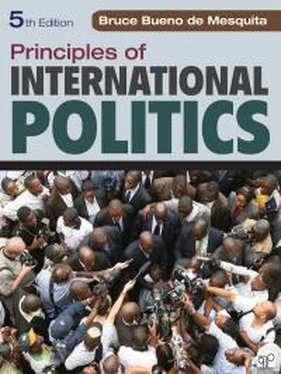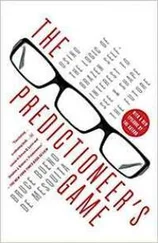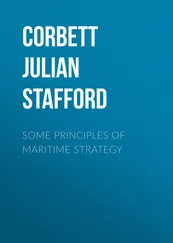Peace and war both provide time to lay the foundations for world order. Between some idealized notion of peace and some extreme circumstance of war lies the realm of world order in which carrots and sticks, rewards and punishments, development and nation building, alliances and cartels are all used to structure daily interactions and to provide solutions—for better or worse—to fundamental foreign (and domestic) policy questions.
DOMESTIC POLITICS SHAPE INTERNATIONAL POLITICS
Most explanations of international politics assume that states are the central players. I disagree. I contend that decision makers are the main players and that to understand their policies in the international arena we must evaluate how their actions are colored and shaped by the domestic politics and economics of their country. I will offer what I hope you will agree is compelling logic and evidence for the claim that domestic politics shapes international politics. If we persist in the dominant mode of thinking that views states as actors, pretending that what happens inside them is not important, we will find that international politics appears convoluted and sometimes even perverse, and we will make really big errors in promoting incorrect solutions to pressing foreign policy problems. If we look within states at their domestic circumstances, then much of what now seems confusing will fall into place.
Consider that variations in how free people are in different countries markedly influences governmental trade and security policies, as well as virtually all quality of life indicators. Freer countries, with few exceptions, outperform more autocratic states on just about every measure of peace and prosperity. Freer countries—meaning more democratic countries—just about never fight wars with each other and just about always are more open to free trade than more dictatorial regimes. Yet for all the positive effects of freedom within a country, we will see that sometimes these very internal freedoms act to jeopardize the extent to which a government tries to advance freedom elsewhere in the world. For instance, the two greatest powers in the contemporary world—(1) the United States and (2) most of the countries that collectively make up the European Union—routinely declare themselves in favor of freedom while doing little to advance it. In fact, just about every president of the United States, at least since Woodrow Wilson (1913–1921), has claimed he is committed to the spread of freedom, democracy, and self-determination. Yet, as we will see, American presidents have largely failed to fulfill the promise of freedom, democracy, and self-determination even when the opportunity has landed in their lap. Although international pressures may make the pursuit of democratic nation-building hard, domestic pressures to promote policy compliance from foreign governments may be more significant in deciding whether a hostile foreign democracy is preferable to a docile foreign dictatorship.
Lest you think this is an overly cynical view, reflect on the fact that President Barack Obama ordered his UN ambassador in 2011 to veto Palestine’s bid for recognition as a sovereign state worthy of UN membership. Does this mean that the United States is against Palestine’s quest for statehood? The US government has repeatedly, in administration after administration, said it favors the creation of a Palestinian state under the right conditions. Does this mean that the president personally is against Palestine’s quest for statehood? He personally declared the opposite in Cairo on June 4, 2009, when he said, “[T]he situation for the Palestinian people is intolerable. America will not turn our backs on the legitimate Palestinian aspiration for dignity, opportunity, and a state of their own.”1 Does it mean that a Palestinian state in the United Nations undermines US security? Does it mean that a vote for Palestine might alienate critical swing voters in an American presidential election? Does it mean that the United States values Israel’s interests over Palestine’s? Does it mean that Palestine’s freely, democratically, competitively elected government is not worthy of representation in the United Nations even as dictatorial, oppressive North Korea’s is? Answering these questions can be hard, even painful, but answering them also compels us to think about what motivates important foreign policy choices.
Each of these questions points to a deeply different way to think about international affairs, ranging from some notion of the national interest determining what “states” do to some notion of an individual leader’s interests driving what that leader does in the name of her or his state. This book is squarely in the camp of those who think that all politics—international and domestic—is about leaders doing what they believe best advances their personal interests. Sometimes, and under some methods for choosing leaders, a leader’s personal interests will coincide with what most of her citizenry want, making it hard to tell a leader’s interests apart from what we might think is the national interest. But other times what “we the people” want and what a leader does will be radically different, and then it will be easier to tell whether leaders are concerned about their own political well-being or the welfare of the state and people in whose name they govern. Learning how to tell the difference between leader interests and citizen interests is tricky, depressing, and hugely informative. Indeed, doing so is central to understanding international politics and, in fact, all of politics.
To understand why telling the difference between leader interests and the “national interest” is tricky, we need to learn to systematically evaluate what individuals want and how to translate those individual wants into some meaningful notion of the national interest or the general welfare. You may be surprised to know that translating individual desires into some transparent accounting of the national interest can be profoundly difficult and that knowing whether or not we have done so is, in fact, impossible. Let’s see why.
POLICY AND RATIONALITY
Whether we think of international affairs as the consequence of state actions or individual actions, we must make some assumptions about how actions and objectives are chosen. Surely we can agree that actions are chosen in the hope that they will advance the chooser’s objectives, but exactly how that happens is a trickier issue. If, for instance, we think cultural concerns dominate what people desire, then we must assume that people act on their culturally learned preferences. The same is true whether we assume that internal power arrangements, leader incentives, national security concerns, or pretty much anything else dictates what people, decision makers, or states want and what they do to achieve their desired ends. The alternative to making assumptions that tie actions to desires is to think of people making choices blindly, without regard to what they want—almost like dust drifting randomly up and down in the wind. I dismiss the idea of people as dust particles moving chaotically as in Brownian motion and prefer, instead, to think of each and every one of us as purposive, intent on trying to do what we each think is best for ourselves.
Fortunately, if we analyze people as doing what they think is best for them—and, of course, they could prove to be mistaken in their beliefs—then we have a straightforward way to think about the relationships that tie individual objectives to individual actions. That straightforward way is to assume that whoever (i.e., individual citizens, leaders) or whatever (i.e., states, international organizations) makes choices, makes those choices rationally. Standard accounts that treat states as the important players in international affairs routinely assume that states are rational actors. Thus, the commitment here to the assumption of rationality is nothing new or out of the ordinary; it is standard practice. I depart from much international relations thinking, however, in that I treat individual decision makers rather than whole states as rational. As we will see, this makes for some very important differences.
Читать дальше












